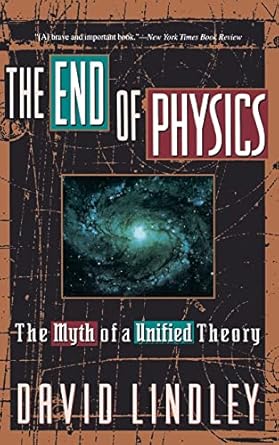Shopping Cart
-
${ item.product_title }$ ${item.price}


People are viewing this right now
David Lindley’s *The End of Physics* argues that the quest for a single, unified theory of physics might be misguided. He explores the limitations of theoretical physics and suggests that the idea of a "final theory" may be more myth than reality. Lindley contends that the pursuit of such a theory could overlook the rich complexity of the universe and the potential for diverse, complementary scientific approaches.
For more than a century, physicists have hoped that they were closing in on the Holy Grail of modern science: a unified theory that would make sense of the entire physical world, from the subnuclear realm of quarks and gluons to the very moment of creation of the universe. The End of Physics is a history of the attempts to find such a “theory of everything”; a forceful argument it will never be found; and a warning that the compromises necessary to produce a final theory may well undermine the rules of good science. At the heart of Lindley's story is the rise of particle physicists and their attempts to reach far out into the cosmos for a unifying theory. Working beyond the grasp of the largest telescopes or the most powerful particle accelerators, and unable to subject their findings and theories to experimental scrutiny, they have moved into a world governed entirely by mathematical and highly speculative theorizing, none of which can be empirically verified. Lindley argues that a theory of everything derived from particle physics will be full of untested—and untestable—assumptions. And if physicists yield to such speculation, the field will retreat from the high ground of science, becoming instead a modern mythology. This would mean the end of physics as we know it.
David Lindley, formerly a theoretical astrophysicist at Cambridge University in England and the Fermi National Accelerator Laboratory in Illinois, has been an editor of the journals Nature and Science and is currently Associate Editor of Science News, in Washington, D.C. He lives in Takoma Park, Maryland.